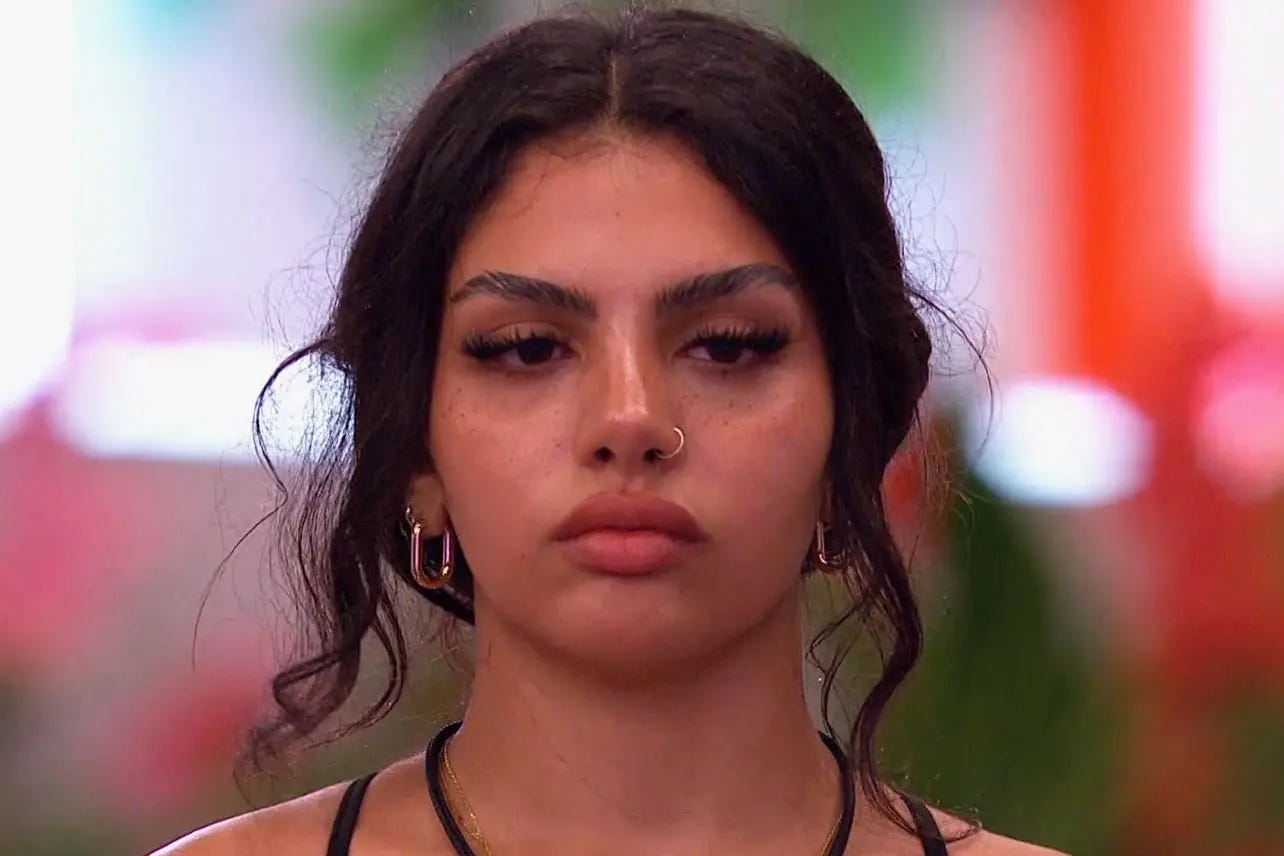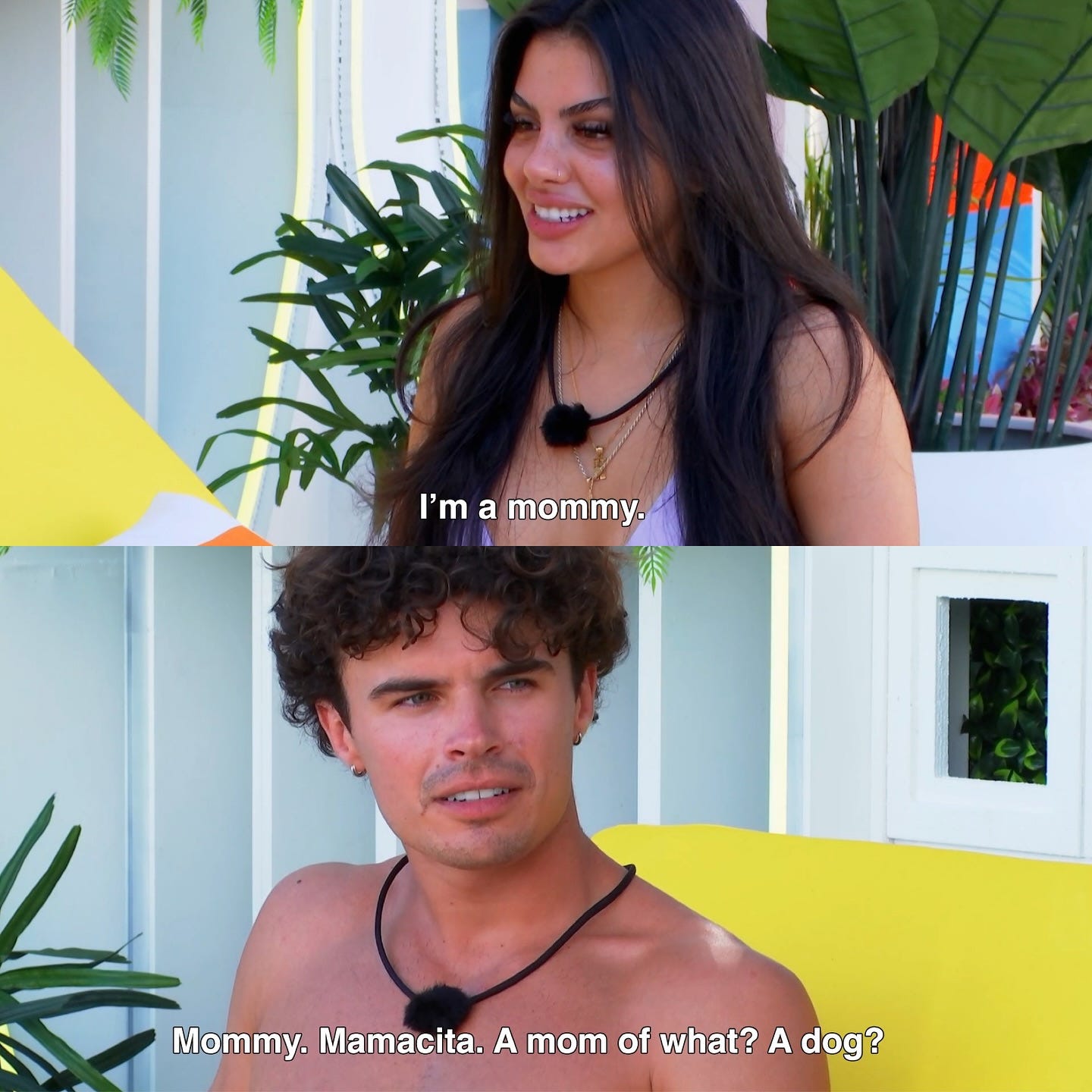Performing for the Cut
thoughts on Huda Mustafa, clip farming, and the performance of feeling in 2025
***SPOILERS for Love Island Season 7***
It was somewhere between the third slow-mo pan of Huda sitting alone, sunglasses on, visibly distressed after Jeremiah returned from his date with Iris, and the TikTok flood that followed, though probably not in the way Huda is imagining, that made me roll my eyes. It’s not just the melodrama. Reality television has always peddled in emotional theater. But this time, I felt more annoyed. Mostly not because of Huda herself, who may or may not be consciously playing to the camera, but because of what watching her makes me feel: captivated but also vaguely sick. Here she was, seated on the poolside, making herself still and tragic in a way that practically begged to be clipped.
And here I was, watching the entire scene again on TikTok fifteen minutes later, now packaged in a square format for optimal virality. We are in the age of clip farming, and Love Island USA is now apart of its softcore epicenter.
Reality television has always garnered the appearance of spontaneity. But in 2025, those who participate in shows like Love Island are no longer just contestants. They’re micro influencers with brand deals on the horizon the second they step off the beaches of Fiji, walking into the villa fully aware of how a viral clip can change the trajectory of their life. I mean, look at Leah Kateb from Love Island USA season 6, her entire life was changed after that dramatic summer. The show has been around long enough for these contestant to know how to tilt their head, when to cry, how to deliver a soundbite that will pop off with millions of hits. They are not just being filmed, they are performing the moment they hope will be filmed.
Huda exemplifies this better than anyone this season I think. Her reactions are big, her one liners are perfectly timed, her sadness feels almost practiced. There is something too performed about the way she yells out insults like “you’re a bitch” or “he’s a fucking liar.” She’s smart, and depending how you read her, either heartbreakingly sincere or acutely aware of how this game is played. Maybe those things aren’t mutually exclusive.
It’s not just that Huda sits alone. It’s how she sits: centered in the frame, shoulders back at just the right angle, giving the impression of nonchalance (which really just looks like devastation) without saying anything. When Jeremiah sees her, a cutaway captures the moment like it’s the climax of a tragic indie romance. This is a posture of pain that looks good on camera. It doesn’t matter if it’s genuine. It only matters that the camera caught it. That we’ll see it online later as her follower count tips upwards and onwards, her legacy living in her attitude on screen.
And we, the audience, eat it up. Not because we’re cruel, necessarily, but because we’re trained now to recognize emotional moments as content. A visible breakdown is just another raw asset to remix, repost, reframe, repurpose into the ground until everyone has had their bite of the meat, has stood on their soapbox. In a strange way, we want these people to hurt just enough, so we can feel something behind the screen too. Is that not what reality television has always been about?
In the season’s second week, after the recoupling that left Huda single and America’s votes put her on blast, she exploded in a way that really does make great TV. Standing in the middle of the villa, yelling across rooms and over conversations, she delivered a line that immediately became iconic, if not for its intention then for its sheer absurdity: he’s using her as a fucking escape goat. A malapropism so perfect in its slip that it couldn’t have been written better by a satirist. And she said it twice. Lol.
In that moment, her voice raw, eyes blazing, fury almost childlike in its desperation to be believed by the girls, something clicked between her and us. Within hours, the clip was everywhere: sliced, diced, captioned, soundtracked, reborn in TikTok lip syncs and reaction videos. There were reenactments. Commentary breakdowns. Tweets debating whether the misuse of escape goat was an act of linguistic failure or strategic genius. Thought pieces on her gameplay. In less than 24 hours, the moment became a meme, a symbol, probably a t-shirt slogan and sticker collection once this whole thing is over so she can cash in on her misfortune. It didn’t matter what she meant or how she felt, it only mattered that it was content in the end. It’s what will be remembered in compilations in years to follow. Her romance will shy in comparison to her moments of rage.
Maybe that’s the real humor. That we live in a culture where something doesn’t have to be coherent or even true to be valuable. It just has to be usable. Replicable. Clippable.
Virality is the new authenticity, and what gets remembered isn’t the pain in someone’s voice or the context that led them there, but the phrase they shouted while angry and upset. We don’t care if someone is humiliated anymore, or misunderstood, so long as it makes for a good pull quote or article (cough, this right here, cough). In a different time, Huda’s breakdown might have bene read as a person in distress. But in 2025, it feels like a product launch. A phony. A mini media event. A way to gain clout. The internet doesn’t care who you are. It only cares what it can turn you into.
What does it mean, then, when a person like Huda cries on television? Is she manipulating the audience? Playing the game? Being a scammer? Taking the easy route? Is she simply expressing herself in a way that’s been shaped by years of social media feedback loops? Is it all of that combined? What does it mean when the rest of us, watchers, sharers, commentators, consume the moment so eagerly? Are we seeking truth, or are we just bored? I think Huda, for better or worse, is doing exactly what she’s been taught. Make it big, make it loud, and make it look good for the screens. She is no stranger to social media, with a robust TikTok page before coming to island, so she is not ignorant to how her moments are appearing to us, even if she is unaware of our reaction.
The easiest thing to do is to call her fake. To say she’s just doing it for the cameras. But the harder thing, the truer thing, is to realize that she’s not doing anything we might not do in her place. No one knows how they would react when the cameras are on them all day, prize money dangling in front of their face like a rabbit with a carrot, the promise of finding their true love in the mix. We’re all curating. We’re all framing our own clips, the perfect tweet, the viral selfie, the vulnerable paragraph in the notes section posted to Instagram, even if it’s only in our head imagined. We want to be real, but being real in a way that gets engagement can be a powerful drug. Huda just happens to be doing it with better lighting on her and a higher stakes prize. She’s a problem, but she’s also a mirror to a larger picture in society.
This isn’t just a Love Island story, it’s a story about what it means to be watched, and how that changes what it means to be human while you’re on camera. In a world where we often place value over anything else, determined by visibility, emotional expression can become transactional, intimacy can become a spectacle, vulnerability a brand. Moments turned into money.
Huda may be clip farming, or she may not be. Maybe she’s calculated or cracked open. Maybe she has learned, like the rest of us, how to survive inside the content machine by feeding it what it wants. I don’t know. Either way, her time in the villa isn’t just entertainment, she’s doing what the culture taught her to do. And I can’t really hate her for that as I chomp down my popcorn watching her on my screen. I’m just doing what I was taught to do. Watch, judge, laugh, share, forget, move on.
But if we can sit with it, if we can resist the scroll, we might see something deeper if we really try. We might be able to see that under all the performance and the alleged crocodile tears and the theatrics is a person. That under her spectacle is her story. And if not, it’s a damn good season of Love Island USA. It’s giving the Brits a run for their money if I do say so myself as a long time Love Island UK fan dating back to my late high school years.
**If you’ve enjoyed my writing, if it’s made you laugh, think, or feel a little less alone, you can now pledge your support! Every bit means the world to me.**
If you want to see more from me, here are all the profiles I could think of to link!
Instagram + Letterboxd + GoodReads + TikTok + Spotify + Medium







